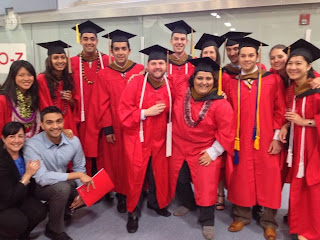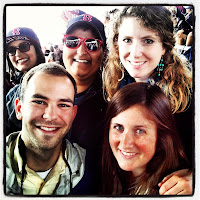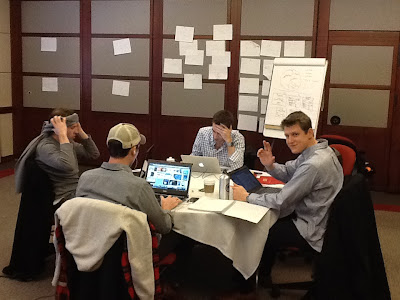Living In the Far East
 The Boston University One-Year International MBA (IMBA) program has found a great recipe for creating strength amongst a diverse group and expanding leadership acumen. This past summer, my twenty-five classmates and I lived in China, in the same apartment complex, engaging in rigorous course study. We were provided the opportunity to live in Shanghai, one of the fastest growing cities in the world, and Beijing, a city steeped in history and tradition. My cohort is comprised of students from Chile, Panama, Mexico, Peru, India, Indonesia, Thailand, Hong Kong, Taiwan, China, Russia, Israel, Germany, and the USA. Even though the IMBA is an accelerated program, we always found time to have fun and explore all that China had to offer while also getting to know each other’s cultures. Afterwards, we had a group that considers each other to be a “second family” due to the incredibly unique experiences we have shared.
The Boston University One-Year International MBA (IMBA) program has found a great recipe for creating strength amongst a diverse group and expanding leadership acumen. This past summer, my twenty-five classmates and I lived in China, in the same apartment complex, engaging in rigorous course study. We were provided the opportunity to live in Shanghai, one of the fastest growing cities in the world, and Beijing, a city steeped in history and tradition. My cohort is comprised of students from Chile, Panama, Mexico, Peru, India, Indonesia, Thailand, Hong Kong, Taiwan, China, Russia, Israel, Germany, and the USA. Even though the IMBA is an accelerated program, we always found time to have fun and explore all that China had to offer while also getting to know each other’s cultures. Afterwards, we had a group that considers each other to be a “second family” due to the incredibly unique experiences we have shared.  My second takeaway from my China experience was the art of negotiation. I always felt a little uncomfortable negotiating but I knew it was a valuable asset in the business world. I found that my international classmates are extremely good at negotiating because often it is a regular part of their culture. They taught me that negotiation requires a thought out strategy and having an understanding of when to walk away. My classmates coached me through leveraging the power of indifference to negotiate a fair price. In my time spent negotiating for goods, my classmates also taught me that there is always a real decision maker. Whether it’s a business owner or club promoter, pinpointing the person in power makes negotiations more productive.
My second takeaway from my China experience was the art of negotiation. I always felt a little uncomfortable negotiating but I knew it was a valuable asset in the business world. I found that my international classmates are extremely good at negotiating because often it is a regular part of their culture. They taught me that negotiation requires a thought out strategy and having an understanding of when to walk away. My classmates coached me through leveraging the power of indifference to negotiate a fair price. In my time spent negotiating for goods, my classmates also taught me that there is always a real decision maker. Whether it’s a business owner or club promoter, pinpointing the person in power makes negotiations more productive. 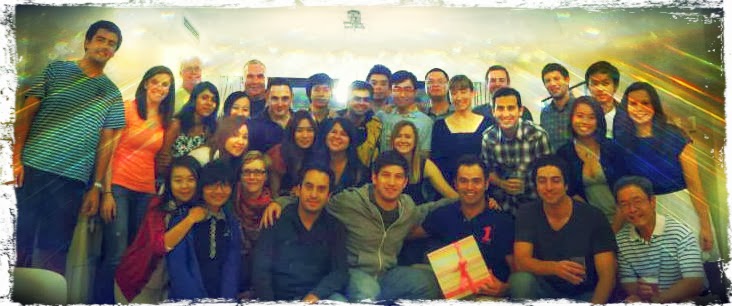 Mark Twain said, “Travel is the death of ignorance.” After 3 months of immersion in China, I am more knowledgeable about the complexity of Chinese life and the beauty of interconnection among truly diverse cultures. I developed relationships that are so deep it’s hard to imagine these people haven’t always been a part of my life. I acquired skills that I never knew I could. I saw some of the greatest wonders of the world and I learned about China firsthand, this social and political powerhouse that previously I’d only perceived from afar. The International MBA program is challenging, but I can guarantee its academic and social recipe will make your life much richer than you ever expected.
Mark Twain said, “Travel is the death of ignorance.” After 3 months of immersion in China, I am more knowledgeable about the complexity of Chinese life and the beauty of interconnection among truly diverse cultures. I developed relationships that are so deep it’s hard to imagine these people haven’t always been a part of my life. I acquired skills that I never knew I could. I saw some of the greatest wonders of the world and I learned about China firsthand, this social and political powerhouse that previously I’d only perceived from afar. The International MBA program is challenging, but I can guarantee its academic and social recipe will make your life much richer than you ever expected. Final Thoughts from Outgoing Graduate Student Council President, Sonal Dhingra
P&G Gillette Sustainability Challenge
Post by:
Gilberto Millares
IMBA 2013
Some of Procter &Gamble’s sustainability goals for the future include completely eliminating the waste they currently generate, using only renewable energy in all their facilities, and having environmentally-friendly products and packages. As you might guess, such endeavors present an extremely difficult challenge for a global company, so they are constantly looking for ways to make marginal or disruptive changes in their operations that allow them to be closer to achieving these goals. One of these ways is to sponsor the P&G Gillette Sustainability Challenge, which brings together multi-disciplinary teams from different Boston University schools and challenges them to come up with ideas that might be applied in their operations.
On April 12, eight teams, consisting of undergrad and graduate students from the schools of Engineering, Public Policy, Management and Biomedical Engineering, among others, had the opportunity to showcase their findings to a group of managers from P&G Gillette, Veolia and NSTAR. We presented different ideas that would allow P&G to increase their renewable energy consumption at the South Boston Gillette site by making a business case for each proposed project.
 |
| The judging panel from P&G Gillette, Veolia, and NSTAR |
While the format differed a bit from the standard case competition, the results were just as meaningful. Rather than diving into the project for 48 hours, we were given two weeks to find different approaches to help them achieve their goals. And even though it might sound like more than sufficient lead time, we had to fit several seminars into our busy schedules to learn about energy projects throughout the country and the world, research technologies that are being implemented in the industry, and find ways to link business and engineering aspects for each submitted idea—no easy task!
 |
| The winning team and judges pose for a photo |
Finally, after all the teams had presented their ideas, we had a small reception as the judges were making the final decision. First place was awarded to a team consisting of MBA and IMBA students, as well as LEAP, Mechanical Engineering and Public Policies students, who will now have the opportunity to present their pitch to a group of Gillette’s top managers. However, I think the most rewarding aspect of the competition was working with a truly diverse group of people that mimics the diversity and complexities of the business world.
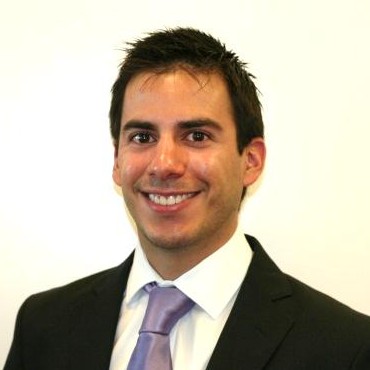 Gilberto Millares is an International MBA student with experience in strategy and operations consulting. In his spare time he loves watching indie movies and cooking “real” Mexican food.
Gilberto Millares is an International MBA student with experience in strategy and operations consulting. In his spare time he loves watching indie movies and cooking “real” Mexican food.
Broomball!
Post by:
Sapna Saxena
MS-MBA 2014
We spend a large portion of the day at SMG – whether in class, team meetings, the library, or at the SMG Starbucks grabbing much-needed coffee. We connect with our classmates through class discussions and over a drink during Thirsty Thursdays and other social gatherings. Conferences are nonstop and networking builds professional connections that further our experience here at Boston University.
But let me tell you where the magic really happens.
Broomball.
I didn’t realize many universities do not offer broomball as an intramural sport – and so when my classmates asked what broomball is, I jumped at the opportunity to explain it to them.
For those of you who don’t know, broomball is a sport similar to ice hockey. You wear a helmet, carry a stick, and, along with your teammates, you aim to score goals by hitting a ball into a tended net. There is just one thing...
You play in your sneakers.
 |
| Shreya Shah (MBA 2014) passing the ball to either Kyle Adelman or Vineesh Plakkot (both MBA 2014)...you can’t really tell. |
The result: Everyone falling on top of one another and crashing into the boards. Never played before? No need to worry, as you’re essentially on the same playing field as your teammates-- hardly anyone comes to the game better than a beginner. Your athletic prowess has no bearing on how well you’ll do at broomball because, frankly, just about everybody wipes out and lands on the ice as they attempt to one-time the ball into the net (the bruises show up the next morning).
 |
| Falling hard on the ice. Yep, that’s me. |
Tempting, I know.
In all of its ridiculousness, broomball is some of the most fun I’ve had since business school started.
After spending hours performing marginal benefit analyses, preparing strategy cases or researching a company for my summer internship, it’s a nice feeling knowing that we can all get together, run around on an ice rink, play against the undergraduates and have a TON of laughs. It’s a great way to bond, relieve stress, exercise and connect with classmates from other cohorts.
To me, broomball offers up another opportunity to get to know the people who are joining the network you develop in business school – just not with the formality of conferences or the feel of most standard organized networking events. Competition is always healthy, and to take to that competition as a united team (albeit bruised and sore) against the undergrads is a necessary and, well, gratifying experience.
 |
| Mark Grimm, Mike Greene and me (all MS-MBA 2014) at the bench. |
You go to business school because you want to expand your networks, acquire skills you don’t have, and move forward along your personal and professional paths. Interviews and case-prepping are important, and will always be a part of the b-school life. But it’s good to have to an outlet to remind you that fun, regardless of how old you are, is also important. For me and many of my classmates who make the weekly trek to Walter Brown Arena, that fun lies on the broomball ice.
 |
| Team picture: Kyle Adelman, Shreya Shah, me, Nina Desai, Marisa Porter, Vineesh Plakkot, Mark Grimm, Paul Uncanin and Mike Greene (all MBA 2014). |
 Sapna is a first year MS-MBA student concentrating in Marketing. Her most recent experience comes from the startup world, where she spent two years as a market strategist exploring new growth opportunities for her company. When she's not getting her classmates to come out to Cohort Cup events (she's the Cohort B representative), she continues her search for the best Indian and Sichuan restaurants in Boston.
Sapna is a first year MS-MBA student concentrating in Marketing. Her most recent experience comes from the startup world, where she spent two years as a market strategist exploring new growth opportunities for her company. When she's not getting her classmates to come out to Cohort Cup events (she's the Cohort B representative), she continues her search for the best Indian and Sichuan restaurants in Boston.
Grand Business Challenge in Digital Health
Post by:
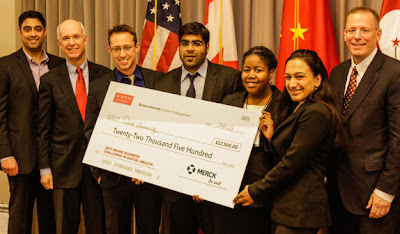 |
| Congratulations to the team from Fuqua! |
![]() Lara is a 2nd year MS-MBA student who has lived most of her life in Norway, despite having an American passport. Before coming to BU she worked in IT, Sales and Marketing and is hoping to find an opportunity to do something cool in a technology firm - UX, product development, or something in those veins. One of her biggest surprises over the past two years is learning how fun it is to play broomball!
Lara is a 2nd year MS-MBA student who has lived most of her life in Norway, despite having an American passport. Before coming to BU she worked in IT, Sales and Marketing and is hoping to find an opportunity to do something cool in a technology firm - UX, product development, or something in those veins. One of her biggest surprises over the past two years is learning how fun it is to play broomball!



